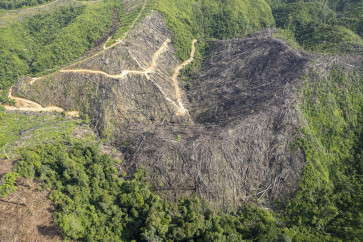Popular Reads
Top Results
Can't find what you're looking for?
View all search resultsPopular Reads
Top Results
Can't find what you're looking for?
View all search resultsIndonesia and the EU supporting multilateralism
The globalized world of today offers unlimited development potentials, but also bigger risks than ever: increasing populism, terrorism and radicalization, power shifts and realignment, disregard of international law, global warming, unprecedented migratory flows and growing discontent against economic and trade policies among many others
Change text size
Gift Premium Articles
to Anyone
T
he globalized world of today offers unlimited development potentials, but also bigger risks than ever: increasing populism, terrorism and radicalization, power shifts and realignment, disregard of international law, global warming, unprecedented migratory flows and growing discontent against economic and trade policies among many others. More and more countries are turning to unilateralism and isolation to face these challenges.
Against this backdrop, there is now greater scope for Indonesia and the European Union (EU) to align their policies. Both believe that the answer to the world’s problems is more — not less — multilateralism. Both want to uphold a rule-based order anchored in the multilateral system and the United Nations (UN).
The EU, in its global strategy published in June 2016, has made the commitment to a global order based on international law, which ensures human rights, sustainable development and lasting access to the global commons. Indonesia has always relied on multilateralism as a platform to advance peace and development. Both want to see the UN become more versatile and have the necessary means and capacity to address increasing challenges of today’s world.
One key area of cooperation is in climate change. Indonesia is a key carbon sink country, and EU is at the forefront of climate diplomacy. Both Indonesia and the EU are convinced that the implementation of Paris Agreement is the best and only way to curb global warming and protect our planet.
One visible example is how human action has left our oceans heavily affected by pollution, overexploitation, coastal degradation and global warming. This has severe consequences for all not only Indonesia, an archipelago state, but also in the European continent.
Indonesia will host “Our Ocean” conference in 2018 after the 2017 edition hosted by the EU in Malta early October. This shows Indonesia’s and EU’s shared vision to respond to world challenges with strong and action-oriented commitments.
Indonesia and the EU are also firm believers in preventive diplomacy, peace-making and peace keeping. The EU brokered talks between Iran and (E3/EU+3) to ensure a peaceful civil nuclear program in Iran and this multilateral endeavor was sanctioned by UN Security Council. This agreement is still legally valid and undoubtedly contributes to a safer and more peaceful world.
In the recent crisis in Myanmar, Indonesia is playing an important role and spearheading efforts for a regional solution and enjoys the full support of the EU.
Indonesia is the eighth top UN peacekeeping contributing country and is aiming at providing 4,000 peacekeepers by 2019. The EU also contributes to world peace and security through 5,000 civilian and military personnel deployed in EU led 15 operations, many under the umbrella of the UNSC.
The Democratic People’s Republic of Korea (DPRK) is another major challenge where the unilateral approach will not work and efforts in the multilateral fora should be pursued to put an end to ballistic and nuclear test that creates instability in this region.
As stated in our partnership and cooperation agreement (the first one in the ASEAN region), Indonesia and the EU are committed to the principles of the UN charter, the respect, promotion and protection of democratic principles and fundamental human rights, rule of law, peace and international justice.
We share the same motto, “unity in diversity”, and yet Indonesia and the EU have different approaches in international fora. For example, the EU is vocal on upholding human rights worldwide (such as the dire situation in Syria or the DPRK) while Indonesia remains faithful to the non-interference principle.
But the fact that we openly discuss these disagreements in an intense and respectful dialogue makes us solid partners. Both can still speak to each other, listen to each other’s criticism and cooperate in many common challenges. Most importantly, we have a similar understanding of the global order based on multilateralism and on international law.
Vice President Jusuf Kalla said at the opening of the UN General Assembly in September “Unilateralism is not a sustainable solution. The world needs a strong partnership [...] a true global partnership.” As global politics faces uncertainty and yet another crossroad, the EU and Indonesia have convergent strategic interests to become stronger partners to uphold multilateralism and keep the world on steady course.
____________________________
Vincent Guérend is the EU Ambassador to Indonesia and Brunei Darussalam. Dino Patti Djalal is the founder of Foreign Policy Community of Indonesia.










